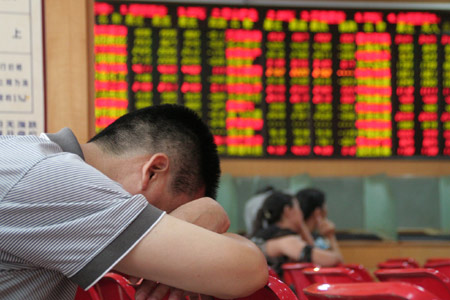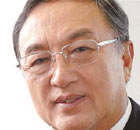Money
Bears take center stage as tightening fears grow
By Zhang Shidong (China Daily)
Updated: 2010-05-12 11:26
 |
Large Medium Small |
|
 |
|
The Shanghai index has slid 19 percent this year, the world's worst performer after Greece amid concerns the government will increase efforts to curb speculation in the property market, hurting economic growth.[China daily] |
BOC, China Merchants Bank lead decline in equities on Shanghai bourse
SHANGHAI - China's stocks dropped, sending the benchmark index into a bear market, on concern the government will raise borrowing costs to combat inflation and unveil more measures to curb soaring housing prices.
Bank of China Ltd and China Merchants Bank Co dropped at least 1.7 percent after a government report showed consumer prices exceeded estimates. Poly Real Estate Group Co, China's second-largest developer by market value, plunged 2.7 percent as property prices increased at a record pace in April.
"If inflation isn't contained, the central bank will have to raise interest rates," said Zhao Zifeng, who helps oversee about $10.2 billion at China International Fund Management Co in Shanghai. "We'll still need to gauge housing prices in the coming months as the previous crackdown measures were put in place not long ago. More tightening policies could follow."
The Shanghai Composite Index, which tracks the bigger of China's stock exchanges, fell 51.18, or 1.9 percent, to close at 2647.57, the lowest in almost a year. The measure slid 21 percent from the close of 3338.66 on Nov 23, a sign analysts say is a bear market. The CSI 300 Index lost 2 percent on Tuesday.
The Shanghai index has slid 19 percent this year, the world's worst performer after Greece among the 93 gauges tracked by Bloomberg, on concern government will increase efforts to curb speculation in the property market, hurting economic growth.
China's consumer prices rose 2.8 percent in April from a year earlier, the fastest pace in 18 months, and property prices jumped 12.8 percent, the statistics bureau said on Tuesday. New lending of 774 billion yuan, announced by the central bank, was more than any of 24 economists forecast. Faster inflation increases pressure on the government to boost borrowing costs for the first time since 2007 and allow the yuan to appreciate.
Rate caution
The gain in consumer prices compared with a 2.4 percent increase in March and the 2.7 percent median estimate of 30 economists surveyed by Bloomberg News. The government aims to contain full-year inflation at 3 percent after record lending drove economic growth of 11.9 percent in the first quarter.
"Though CPI is at a high level, the European debt crisis has made the government very cautious about raising interest rates," said Dai Ming, a fund manager at Shanghai Kingsun Investment Management & Consulting Co. "Declines in housing prices are a big possibility and that will help ease tightening expectations."
US stocks rallied the most in more than a year on Monday after European policymakers unveiled an unprecedented loan package worth almost $1 trillion, a program of bond purchases to stop a sovereign-debt crisis.
Europe's rescue package will allow Chinese officials to focus on containing asset prices and inflation at home rather than worrying about the global recovery, central bank adviser Li Daokui said.
The central bank has ordered lenders to set aside more deposits as reserves three times in 2010. The government also imposed a ban last month on loans for third-home purchases and raised mortgage rates and down-payment requirements for second home purchases to curb housing prices.
"The latest round of these fine-tuning measures were only put in place a few weeks ago, so it is probably too soon to judge their effectiveness," said Brian Jackson, a strategist at the Royal Bank of Canada.
Bloomberg News















